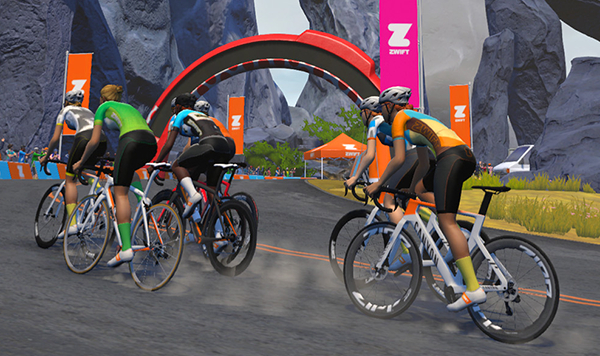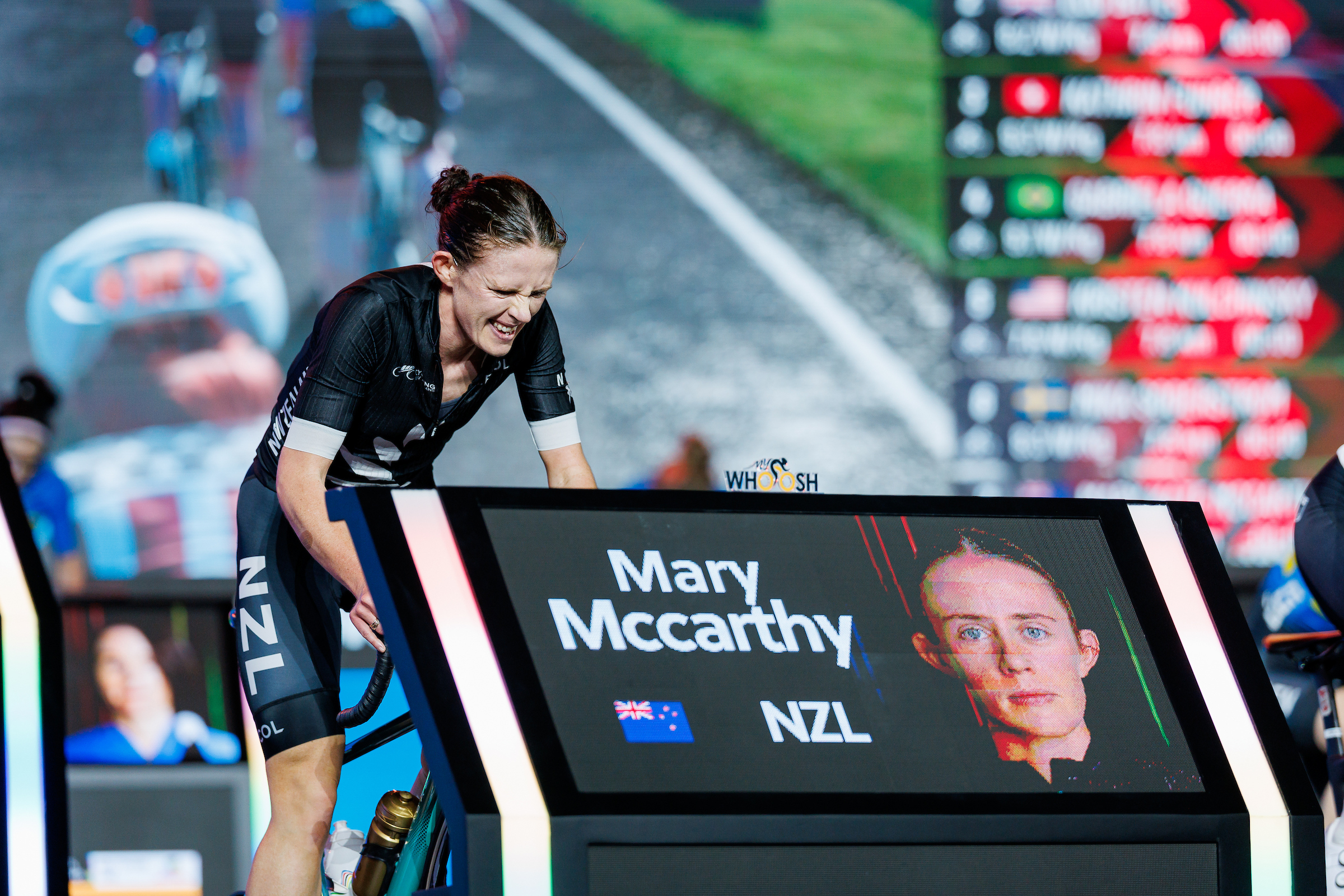
Amid a racing season marred by multiple racer annulments, mid-series format changes, and ruleset amendments, Zwift has halted its elite five-race Zwift World Series.
In an email sent to racers this week, Zwift announced the decision to pause the Zwift World Series, confirming the series' fourth race scheduled for December 5th will not go ahead.
Zwift's Director of Racing, Sean Parry, explained the platform's predicament, "This decision has been made after a thorough review, and it has been driven by our desire to uphold the reputation of our sport and protect the well-being of the athletes."
At the heart of the issue is a series of athletes' power readings that have unnaturally drifted upward during certain efforts, somewhere in the region of six to eight per cent.
But rather than anything sinister such as equipment tampering or attempted cheating, it appears this is due to smart trainers reading inaccurately under certain stresses. The drift occurs during high-torque low-cadence efforts, such as those found on steep climbs, and has affected smart trainers from both Wahoo and Elite.
They are described as an "edge case" that affects only a handful of elite racers pushing their equipment to the limits, rather than an endemic issue affecting all indoor cyclists.
It has only come to light due to the dual-recording requirements of elite cycling esports races, something that everyday users tend not to do.

Athlete AnalytiX, an independent performance verification service headed by the former head of ZADA (Zwift Accuracy and Data Analysis), Bjoern Ossenbrink, contracted by Zwift for the 2024/25 elite season, detected the accuracy issues.
All elite cycling esports races require dual power meter recordings to ensure consistency by comparing readings from multiple sources, usually a crank or pedal-based power meter alongside the smart trainer.
A problem occurs when the two separate power files show unacceptable differences, that vary under different race scenarios without specific definable causes or logical explanations from the manufacturers and auto-calibration protocols that introduce errors and the false perception of accuracy.
Parry summed it up, stating, "This season in the Zwift World Series, we have seen, and we continue to see, a much higher volume of issues with hardware accuracy than we ever have in the past. Unfortunately, this has resulted in many annulments, race-to-race uncertainty for athletes, and created considerable challenges for our performance verification team and commissaire. We understand and empathize with the strain that this has put on riders throughout the series, and this is not something we can allow to continue."
Not a new issue
Word of the problem initially went public before the series' second race in early October. Athlete AnalytiX identified anomalies in power output for several riders, occurring exclusively during climbs (steep gradients at high power outputs) on the race route.
These discrepancies prevented the verification of their performances. Since all affected riders used the same Wahoo trainer model, Zwift and Athlete AnalytiX initiated an investigation with the Wahoo to determine the cause, prompting this statement at the time from the smart trainer brand.
“Under extreme conditions—specifically high absolute power on extended climbs at 100% trainer difficulty—power may drift slightly on KICKR V6 and MOVE only. We believe this to be an edge case that impacts only the most powerful indoor racing specialists. We are working on a bug fix, but in the interim, we advise elite riders to set trainer difficulty to 50%.”
Until today, that fix had not arrived, but Wahoo tells Cyclingnews that a fix is now being rolled out specifically for esports racers for the Kickr V6 and Kickr Move.
"Zwift have been in communication with all the relevant hardware manufacturers and Wahoo is one of these," read a statement from Wahoo. "We have worked quickly on a fix for elite indoor riders competing in events over the coming month - this is now available for KICKR V6 and KICKR MOVE, we expect a fast follow for those KICKR V5. There will be a full rollout to all Wahoo users in early January 2025.”

In late September, New Zealand's Kate McCarthy used a Elite Justo smart trainer to win the Zwift World Series second race, but her result was subsequently annulled. The Independent Commissaire absolved McCarthy of any intent to cheat, stating, "The rider experienced a hardware malfunction which led to a material difference between the trainer and power meter for the duration of the race."
But the court of public opinion felt otherwise, prompting McCarthy to fend off performance authenticity questions following her 2024 UCI Cycling Esports World Championship victory, hosted in the UAE by MyWhoosh.
“I had a point to prove this week," McCarthy said in her winner's press conference after riding a UCI-standardized smart trainer in a live setting, dispelling doubts.
Brazil's Gabi Guerra, silver medallist in that World Championships race behind McCarthy, used an Elite Justo 2 smart trainer when Zwift annulled her after winning Zwift World Series race 3 in a solo breakaway.
The Independent Commissaire's report read, "The rider was riding a brand-new Elite Justo trainer that had undergone factory calibration. This was the first time the smart trainer was used in the Zwift World Series. Throughout the duration of the race, for reasons unknown, material and inconsistent variances between the smart trainer and the power meter occurred. This rider is not at fault, the performance cannot be verified."
Several other male and female racers fell a similar fate and experienced significant stress and anguish due to ZWS annulments.
"To have our whole race season hung up like this is insane"
The postponement decision has sparked consternation among racers, many of whom structure their competitive seasons around the Zwift World Series. Frustration is mounting as racers find themselves catching the most heat, forced into the position of defending their integrity amid ongoing challenges.
Zwift plans to reschedule the final two races of the elite season to follow the Zwift Games in March 2025. Given qualification for the Zwift Games depends on performances in these concluding Zwift World Series events, this raises questions that Zwift is yet to answer.
"To have our whole race season hung up like this is insane," passionately exclaims elite racer Dean Cunningham, "but it shows how reliant we are on this hardware."
Unfortunately, this is not a new problem anyone thinks will be realistically solved soon, and questions also surround the involvement of the sport’s world governing body, the Union Cycliste Internationale (UCI).
The UCI's Head of Innovation and Esports at the time, Michael Rogers, in a January 2024 interview, told The Zommunique, "We are quite advanced in homologation of smart trainers. We are prepared to announce something within two to three months."
Rogers alluded to the UCI's collaboration with Purdue University's Engineering department to create a smart trainer homologation program. Ten months later, the initiative isn’t implemented.

New rules and more trust
"Given the events that have occurred," states Zwift's Parry, "we will also take this opportunity to revisit and update our ruleset for elite racing. Our emphasis remains on maintaining the highest levels of fairness possible but we would like to explore sanctions and remedies that are less severe than the current rules when athletes encounter unintentional infractions outside of their reasonable control."
The racing community worries that the only viable solution might involve lowering verification standards to compensate for the industry's slow adaptation. It could also lead to more restrictive and potentially costlier equipment requirements, adding to the already significant technological barriers to entry into the sport.
Parry urges that Zwift is taking steps to dissuade this, stating, "Whilst the equipment on the ZWS whitelist (approved hardware for elite competition) works extremely well for 99+% of indoor cyclists, the extreme demands that some elite racers place on hardware mean that there are edge cases that have emerged. We firmly believe these edge cases can be remedied by hardware manufacturers developing firmware updates."
Some racers applaud Zwift for taking action and making the difficult decision to progress the sport.
Ollie Jones, who rose to prominence by winning the 2018 Zwift Academy, has been a consistent force in cycling esports, representing New Zealand in every UCI Cycling Esports World Championship and securing a top 10 finish in 2024. As the current GC leader poised to claim the $3,000 Zwift World Series top prize, the pragmatic Kiwi remains optimistic, viewing this turn of events as an opportunity to drive positive change in the sport.
“I’m obviously disappointed for the postponement, “ shares Jones. “I was excited to defend my leader's jersey over the last two rounds of the ZWS. On the other hand, as a rider who’s seen the highs and lows of this scene for seven years now, I understand that as a remote sport, we don’t have anything without a strong mutual trust in the accuracy of the framework underlying an event. This includes everything from hardware manufacturers to the verification process. I am happy to see further progress implemented into that framework for future events and will be ready to defend my lead when the time presents itself.”
Zwift is postponing the ZWS to give riders and manufacturers the necessary time to better understand, diagnose, and resolve issues, ensuring greater certainty and confidence for athletes moving forward. For Zwift, perfect may be the enemy of good, and the risk of binning its only elite racing series could have irreparable repercussions for the platform and the sport.
South Africa’s James Barnes, a prolific winner in Zwift elite racing and a top 20 finisher at the 2024 UCI Cycling Esports World Championship, is keenly watching how this decision will shape virtual racing and impact his peers.
"I am glad they are addressing the equipment annulments that have been out of the rider's control, taking action, and rewriting the rules and regulations relating to such incidents. It's a shame it caused huge stress for riders at the mercy of the hardware."
The sentiment highlights a core issue: hardware manufacturers, virtual cycling platforms, and governing bodies must collaborate to establish universal standards of accuracy and fairness tailored specifically to cycling esports.
"Joint collaboration between Zwift, hardware manufacturers, and riders during this time will ensure that we can all move fairness in the sport forward together," urges Parry.
Until then, surrendering to the inability to effectively verify athlete performance due to hardware inadequacies casts a poor light on a sport striving to establish itself as a unique cycling discipline. It comes at a crucial time, with the International Olympic Committee's Executive Board soon deciding which sports will feature in the Olympic Esports Games.







